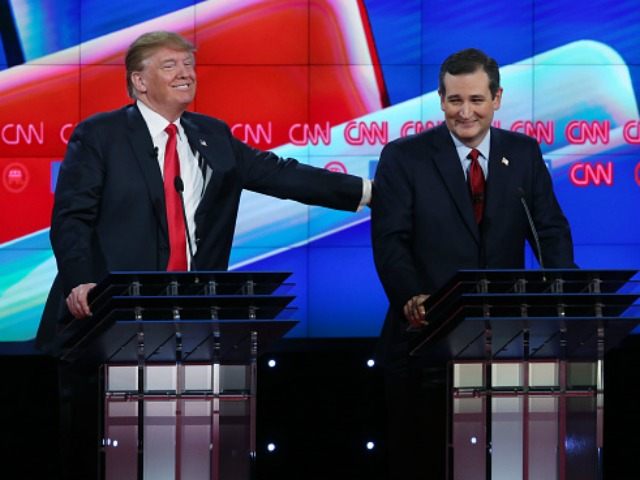Republican frontrunner Donald Trump attacked his main internal rival, Sen. Ted Cruz (R-TX), on Tuesday, noting that Cruz’s Canadian birth could be “very precarious” for Republicans: “Republicans are going to have to ask themselves the question: ‘Do we want a candidate who could be tied up in court for two years?’”
Cruz shrugged it off, tweeting a reference to Fonzie “jumping the shark” on Happy Days. Yet the birth issue may not go away easily.
That is not because Cruz is ineligible for the presidency. In an article in the Harvard Law Review in March 2015, former Solicitors General Neal Katyal and Paul Clement made a compelling argument that the Framers of the Constitution intended “natural-born citizen”–a requirement for the presidency–to include those born to U.S. citizens abroad.
Using originalist arguments, Katyal and Clement noted:
While some constitutional issues are truly difficult, with framing-era sources either nonexistent or contradictory, here, the relevant materials clearly indicate that a “natural born Citizen” means a citizen from birth with no need to go through naturalization proceedings. The Supreme Court has long recognized that two particularly useful sources in understanding constitutional terms are British common law and enactments of the First Congress. Both confirm that the original meaning of the phrase “natural born Citizen” includes persons born abroad who are citizens from birth based on the citizenship of a parent.
They added a note on Cruz: “Despite the happenstance of a birth across the border, there is no question that Senator Cruz has been a citizen from birth and is thus a ‘natural born Citizen’ within the meaning of the Constitution.”
Trump himself has said that he believes Cruz is legally eligible (though he has also suggested otherwise).
The problem, for Cruz, is that during the debate about Barack Obama’s eligibility for the presidency–a debate that began in the Hillary Clinton camp–Obama supporters rarely used the argument that he would have been eligible to be president even if he had been born in Kenya, due to his mother’s U.S. citizenship. They just insisted on Obama’s Hawaiian birth.
They may have had good reason for doing so: even allowing for the possibility of Kenyan birth, as Obama himself once did, might have cast the his credibility in doubt, whatever the legal merits of his candidacy. Regardless, Obama largely left the argument over the precise definition of “natural-born citizen” off the table.
The debate–thanks, in part, to Trump himself–therefore revolved around Obama’s “long-form birth certificate” in Hawaii, as if that were the key piece of evidence that would prove (or disprove) his claim to office. The public was left with the distinct impression that “natural-born citizen” meant someone born on U.S. soil.
The case of Sen. John McCain (R-AZ), born on a U.S. military installation in Panama, did not affect that impression, largely because of a sense that U.S. military or diplomatic facilities abroad are a kind of U.S. territory, and also because of a reluctance to believe those serving the U.S. abroad would thereby deprive themselves of some privilege of citizenship.
Cruz certainly anticipated attacks on his eligibility by renouncing his dual Canadian citizenship in 2013. And Trump has, no doubt, been reserving this tactic for when he felt truly threatened by Cruz, who is surging in the polls, in Iowa and beyond.
But Trump, the non-politician, has proven to be a master of framing political debates to his advantage. Obama may inadvertently have left Trump with enough of an opening to create doubt about Cruz.

COMMENTS
Please let us know if you're having issues with commenting.